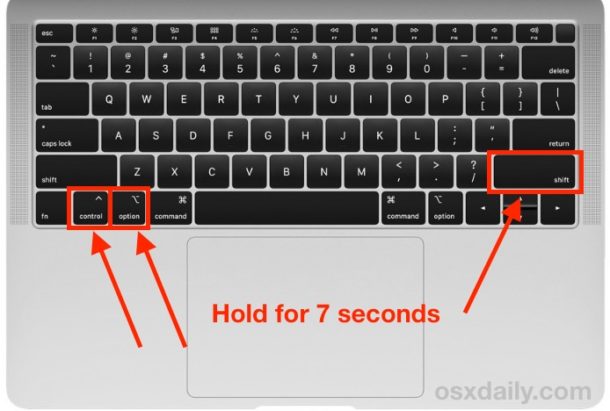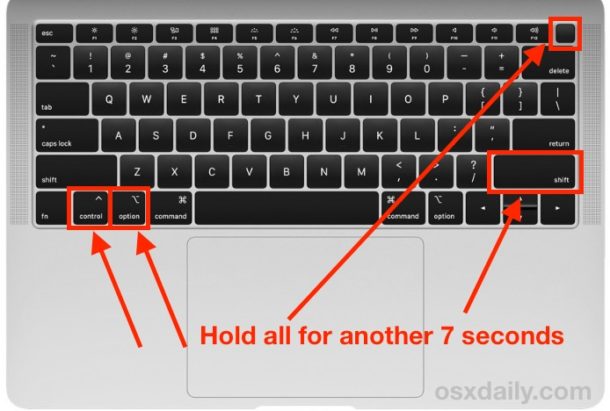How to Reset SMC on MacBook Air & MacBook Pro (2018 and Later)

Resetting the SMC on newer model MacBook Air and MacBook Pro computers from the 2018 & 2019 model year onward is a different process than resetting the Mac SMC on prior Macs, this is because of the T2 security chip that controls Touch ID and secure boot functionality on the latest Intel Mac laptops. Despite being a different procedure, resetting the SMC on the 2019 MacBook Air, 2019 MacBook Pro, 2018 MacBook Air, 2018 MacBook Pro can still be a necessary troubleshooting procedure to resolve some particular issues.
For some quick background, the System Management Controller (SMC) on a Mac is in charge of managing various hardware components of the computer, including fans and thermal management, battery and power management, display and keyboard backlighting, external displays, and other similar low-level hardware functions. Thus if you are experiencing issues with a Mac that pertain to these type of hardware components and functionality, resetting the SMC on the MacBook Air or MacBook Pro may be part of the troubleshooting process, and often an effective one at that.
As mentioned a moment ago, resetting the SMC on these new T2 equipped Macs, including MacBook Air 2018 (and later) and MacBook Pro 2018 (and later) is a different process than resetting SMC on prior Mac models. This tutorial will demonstrate the steps required to reset the SMC on the newest Mac laptop models in the Apple lineup.
How to Reset SMC on MacBook Air & MacBook Pro (2018, 2019, or later)
Resetting the System Management Controller on modern Mac laptops with the T2 security chip is different from the SMC reset process on other Macs, and it’s now a two-step process. Sometimes simply completing the first step alone will resolve the issue, but proceeding with both part 1 and part 2 of the SMC reset process for the troubleshooting process is generally a valid approach on these laptops.
Resetting SMC on MacBook Air / Pro (2018 and later) – Part 1
- Go to the Apple menu and choose “Shut Down” to turn off the Mac
- After the Mac is turned off, press and hold the Power button for 10 seconds
- Release holding the power button, then wait a few more seconds
- Now press the Power button again to turn the Mac on
Check to see if the problem is still occurring on the Mac, sometimes the steps above alone will resolve the issue. If the issue persists, proceed to the next set of steps.
Resetting SMC on MacBook Pro / Air (2018 and later) – Part 2
- Go to the Apple menu and choose “Shut Down” to turn off the Mac
- After the Mac is turned off, press and hold the right SHIFT key, and the left OPTION key, and the left CONTROL key, for 7 seconds
- While still holding those keys, now press and hold the POWER button for 7 more seconds
- Release all of the buttons and keys, then wait a few more seconds
- Now press the Power button again to turn the Mac on


Whatever the issue with the System Management Controller was should now be resolved, assuming the problem was with the SMC in the first place anyway.
If after resetting the SMC the MacBook Pro or MacBook Air continues to experience problems, then perhaps the SMC reset failed in which you can simply try the process again, or the problem may not be related to the SMC, or the issue may not be resolvable by a simple SMC reset.
Remember that SMC related issues are almost always related to hardware issues, like blasting runaway fans, or backlit keyboards not working, or USB-C ports not properly charging the Mac, things of that nature, and SMC related difficulties pretty much never pertain to software or system software. Another common troubleshooting trick for managing other curious related issues is to reset the Mac PRAM / NVRAM, a process which is the same on all modern Mac models.
Problems with system software are sometimes resolved by restoring from a prior backup, or by reinstalling MacOS itself, and problems with software is often resolved by updating the software, or deleting it and reinstalling it, or trashing related preferences.
It’s important to note that the above method of resetting the SMC pertains only to T2 equipped portable Macs with Intel chips, like MacBook Air and MacBook Pro from 2018 onward, and not with any other Mac, nor any Apple Silicon (M1, M2, M4, etc), or older Mac model. If you have a different Mac, then you can learn how to reset those other Mac models SMC here.


Thank you so much in 2025! Grateful for angels of the internet. This worked for me and saved me the headache of going to Apple and paying $$$
Apple quoted £485 to fix my MacBook air 2020.
This guide just saved me that amount.
The genius over the phone told me to hold the shift button on the left instead of the one on the right and of course that did not work.
Following this guide I had it back on in less that 1 minute.
Thank you sooooo much!
I didn’t know of the problem till my laptop was at 2% and now it shut down and usb c is not working so I can’t charge and it won’t power up either.
When apple is going to recall all those Mac’s out there with flex lcd cable braking down after one o less year of use
Thanks resetting smc. Fixed. The USB c ports not charging issue on my 2019 macbookpro
Thank you very much. It worked for me
Fan Kept Running And Macbook Pro Kept Getting hot then resetting my SMC Really worked
It worked when I reset the SMC. Thanks
Thanks !
On of the Thunderbolt ports was not working in my Macbook Pro 15 (2019). Step 2 worked for me !
Thanks, worked for me!
I bought a MacBookPro in September, and it has the “Flexgate” problem. Its also called “Stagelight”. The ribbon wires coming from the computer going thru the hinge to the screen are flexing and breaking down. This issue is all over the web. But I cant figure why Apple is wanting to charge $600 to fix it. Yes, I can, as the wires are an integral part of the screen, so the whole thing has to be replaced. Is this really bad engineering, or planned obsolescence. If it is replaced, whats to tell us that this blunder is not fixed/re-engineered, and just will happen over again.
Our family is shocked and very sad, as we have bought Apple products from day one and never encountered anything as horrid as this. The little computer is almost unusable.
That’s the Apple way…lovely company!